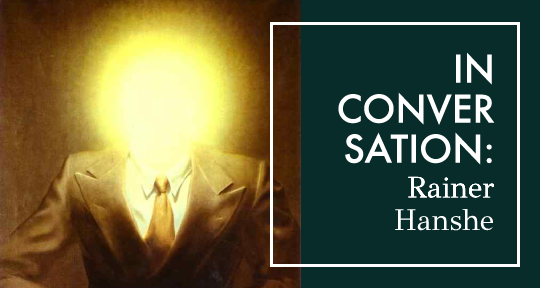Contra Mundum is a New York-based independent publishing house expressly committed to Modernist work and principles. Its catalog includes the dramatic writings and theatre criticism of Robert Musil; Celan’s posthumous prose as translated by Pierre Joris; two “pre-heteronymic” works from Pessoa; the generously-illustrated Letters of Otto Dix; and a late film script from Marguerite Duras. Preference is given texts with limited circulation, the under-translated and outré in particular.
In 2012, for instance, Contra Mundum published Marginalia on Casanova, Tim Wilkinson’s rendering of Volume 1 in Miklós Szentkuthy’s cathedral-commentary-catalogus rerum, St. Orpheus Breviary. Contra Mundum is now five books into its tremendous project, bringing into English an immense cosmophagic-and-collapsing body of prose from a modernist still known as the “sacred monster” of Hungarian letters. In addition to works from the Breviary, Contra Mundum has so far contributed translations of Prae and Toward the One & Only Metaphor (also translated by Wilkinson, who died in October of 2020) and Chapter on Love (translated by Erika Mihálycsa, who will continue as translator for subsequent Szentkuthy works). That CMP should be the publisher to finally give Anglophone readers an adequate Szentkuthy is fitting: press and author share an understanding of zeitgeists alive—in art, in language—across history, unthreatened by chronology or multilingualism. Contra Mundum too experiences its periodic connection to modernism(s) without—or with different—temporal allegiances. In addition to Musil and Pessoa, CMP has published not only Baudelaire and Wordsworth and the Ghérasim Luca of Mary Ann Caws, but also Iceberg Slim, a new Gilgamesh (Stuart Kendall’s), Ahmad Shamlou, Maura Del Serra, and the collected prose of Robert Kelly. Many texts converge around performance, whether onstage, on screens, or in person(ae): CMP has published Elio Petri, Richard Foreman, Pier Paolo Pasolini, Jean-Luc Godard, Rédoine Faïd, and Carmelo Bene. Adjacent to this swirl of codexical text and idea is Hyperion, CMP’s in-house and aptly subtitled journal: On the Future of Aesthetics.
Rainer J. Hanshe is the founder, editor, and publisher of Contra Mundum Press, as well as the author of two CMP titles, Shattering the Muses and The Abdication, and the translator of its three works by Baudelaire. We spoke recently about the nature of (his) modernism and its role in contemporary literature. Deviation, ambition, and heteroglossia were our major subthemes.
Rachel Allen (RA): How does Contra Mundum understand “modernism”? How do you recognize modernist work when you encounter it? (Is modernism limited, temporally? Geographically? Relationally? Formally? To whom is it available to be modernist?)
Rainer Hanshe (RJH): Although Modernism does occur within a specific epochal moment, I don’t see it as bound to that cluster of time, nor do I see it in absolute or purist terms. There is no kind of totemic Modernism with a unified set of precepts that every modernist abides by. Any kind of doctrinaire, sectarian, or dogmatic form of something cannot be abided. We are advancing modernism more as a kind of mobile act or event, like a type of living roving machine (not in a mechanistic sense but as a generative force) or combustion furnace and monster of energy. It is a question of extracting from any period, any event, any moment, its active, productive elements, like taking an arrow shot by Nature, picking it up where it has fallen, and shooting it in new directions, as Deleuze said of Nietzsche.
In that way, art is no different from science in terms of advancements—once a certain insight or knowledge has been developed, there is no reason to abandon it, let alone restrict it to its original moment. Modernism (let’s avoid the term neo-Modernism) is to us protean and metamorphic, an open, indeterminate constellation. Beyond seeing it solely as a specific movement in time then, consider its principal elements as if they were discoveries: a conscious break with tradition (abandoning outmoded elements of classicism); a rejection of historicism and the grand narratives of Western metaphysics, not to speak of its morals and values; the displacement of reason as a ruling force (the curse of the Enlightenment) and fostering in its stead a chiasmic fusion of the rational and the irrational; an abandonment of bankrupt forms of art, such as naturalism and realism (and so representation), which different scientific developments essentially undermined, and Enlightenment-type encyclopaedic projects of totality; related to consciousness and new conceptions of the self and the indeterminacy of the human: interior monologues; stream of consciousness; perspectivalist viewpoints; fracturedness, fragmentation, heteroglossic language, en plus.
It is a literature of incommensurabilities, of a dynamism in signification, of a rejection of absolute truths, of an embracing of dissonance. A literature that is aware of language’s limits, of its fissures, of its cul-de-sacs and cracks, and it vigorously pursues such. Flaubert’s book about nothing; Mallarme’s Le Livre; Beckett’s search for a literature of the unword; et cetera. Modernism understands language as Bakhtin spoke of it: a dynamic entity consisting of an interplay between centripetal and centrifugal discursive forces. The combustive furnace. Heteroglossia. An amalgam of linguistic registers. The Tower of Babel is not a curse. READ MORE…


